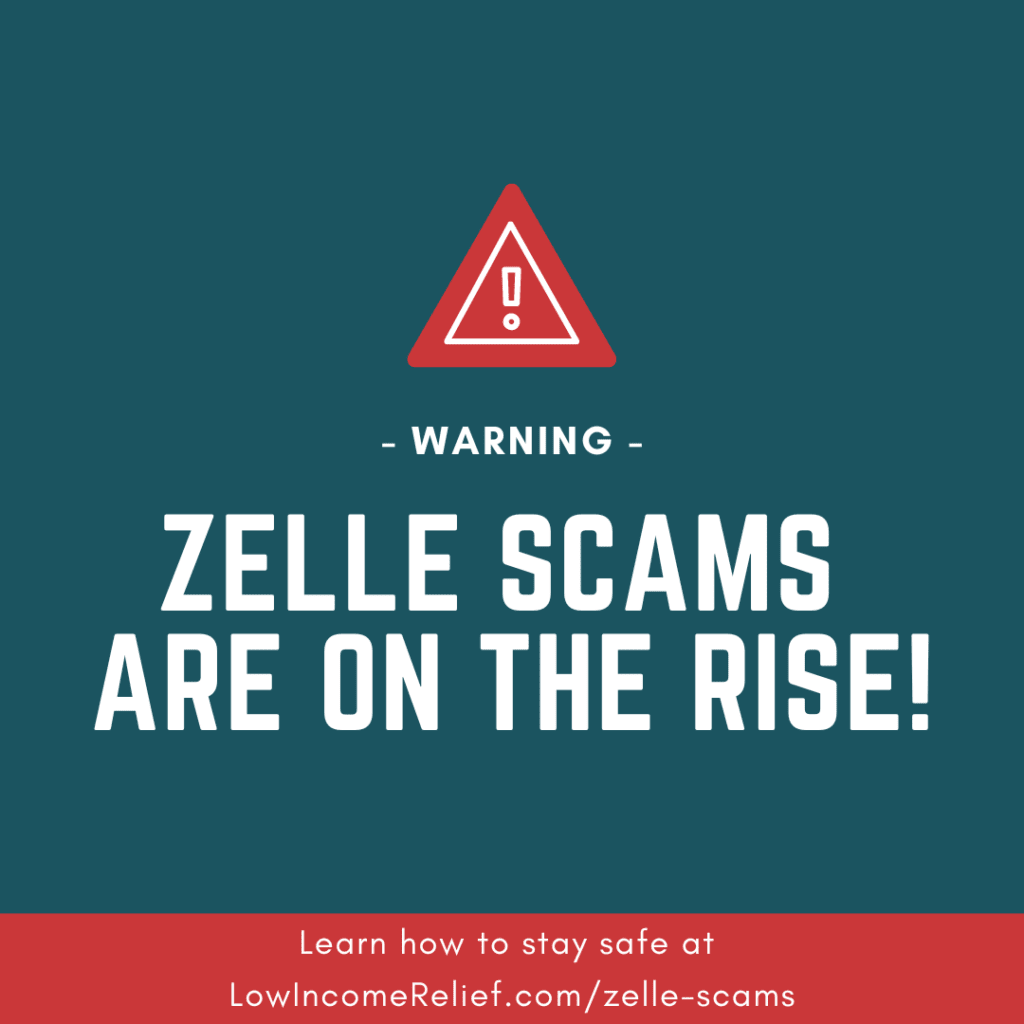Zelle scams are on the rise! It’s more important than ever to know how to recognize a Zelle scam and keep yourself safe from potential predators.
What is Zelle?
Zelle is a payment technology. It’s a fast and easy way to send money to people you know and trust. Zelle is linked to your bank account, so it can easily transfer money between your accounts and your friends or family members.
Many people trust Zelle because it’s already built into their banking apps. Over a thousand banking institutions, including major banks like Chase Bank, Wells Fargo, and Bank of America, offer Zelle within their account dashboards.
Was it Fraud or a Scam?
The first thing you need to understand is the difference between fraud and a scam. These are two very different things. Your ability to recoup your losses will depend on whether you were the victim of fraud or a scam.
Fraud
Fraud occurs when someone gets into your bank account and sends money without your permission. If it’s fraud, then you weren’t involved in the transaction in any way. For example, a hacker accessed your account and sent money without your knowledge or consent.
This is fraud, so you should immediately contact your financial institution. You should be able to get your money back if you are the victim of fraud.
Scam
A scam, on the other hand, occurs when you are tricked into authorizing a payment. You were involved and you did authorize the transaction, but you were tricked or manipulated into authorizing it without understanding what was really happening.
Common scams include things like donating to a fake charity, sending money to claim a prize, making a payment for a fake bill or paying for an item you never received. In those cases, you chose to send the money but the person who received your money wasn’t honest with you.
When you are scammed, it’s harder to get your money back because you did authorize the transaction. Since you gave the okay for the transaction to take place, it’s much harder to get your money back.
If you are the victim of a Zelle scam, you should report it to Zelle right away. You should also reach out to your financial institution, because they may be able to help you recoup your losses or explore your options.
Common Zelle Scams
If you’re a Zelle user, you need to be aware of these common scams. Otherwise, you could end up losing money!
Zelle Scams on Facebook Marketplace
In June 2022, the Better Business Bureau began warning users about sophisticated Zelle scams on Facebook Marketplace. These scams specifically targeted sellers who are selling high-price items like concert tickets.
This scam is elaborate and confusing, so let’s explain it with a story. Let’s say that Sarah was selling concert tickets worth $400.
A potential buyer (we’ll call him Rob) sends Sarah a message immediately after she posted the tickets for sale. He wants the tickets but he wants to pay through Zelle. Sarah reluctantly agrees.
A few minutes later, she receives an email stating that the money was paid via a Zelle business account. Sarah will need to upgrade to a business account in order to claim the funds. Of course, the upgrade will cost money.
Before Sarah can make a decision, Rob sends her a message. He explains that he received the same email from Zelle. To make things easy, he’s willing to pay the upgrade fee so that Sarah can get the money. In fact, Rob sends a screenshot showing that he’d already transferred the money and demands that Sarah pay him back immediately.
Without thinking, she refunds him… only to later discover that the money was never transferred to her in the first place. When she looks at the email she received, she realizes it didn’t come from an official Zelle email address. Rob did not pay for the tickets and he did not send her any money for the fake upgrade fee. Ultimately, Sarah loses the money she refunded to Rob and doesn’t gain anything.
The warning from the BBB specifically references Zelle scams on Facebook Marketplace but in reality, this scam could be run on any platform and with any of the major payment providers.
Fake Fraud Scams
Sometimes, scammers will even pretend to be bankers that are protecting you from fraud. As Edwardo Carrascosa found out, scammers can even spoof your caller ID to make you believe they are calling from your bank. He lost $3,500 when scammers pretended to be from his banking institution’s fraud department. He was able to recoup his losses, but likely only because the local ABC7 news contacted Bank of America on his behalf.
Impersonation Scams
Since Zelle transactions are instant and irreversible, many scams involve trickery. A scammer may impersonate your friend or family member to get you to send money to them.
For example, Grandma Sue received a Facebook message from her grandson Bobby. He said that he’s stranded and needs money immediately so that he can get safely home. He’ll use emotional arguments and create a false sense of urgency to convince Grandma to send money right away. She doesn’t contact Bobby outside of Facebook, so he doesn’t know that Bobby’s account has been hacked. She sends the money and loses it.
Sweetheart Scams
Similar to impersonation scams, sweetheart scams also lure people into sending money to people who aren’t who they claim to be. Sweetheart scams are also known as catfishing or romance scams.
A sweetheart scam begins with a phony profile on social media or a dating app. The scammer will exchange hundreds of messages until the target has fallen in love with them. When the victim is hooked, the scammer will start asking for money for emergencies and other needs. Often, they’ll ask for Zelle transfers.
According to the FTC, people lost more than $547 million to sweetheart scams last year. Over the last five years, the losses were $1.3 billion.
Phishing Scams
Don’t click on unfamiliar links! Scammers can send you links in emails or text messages that can steal your information. If you click through one of those links and it opens your Zelle account, they could steal your username or passwords. Since Zelle payments are fast and irreversible, it’s an easy way for scammers to get access to your funds.
Invoice Scams
If you receive an invoice from a company, always verify the details on their own website. Scammers can impersonate businesses and create very official-looking scam invoices, which can be used to steal your money and data. Do not pay invoices unless you confirm that they are legitimate and, whenever possible, pay with a payment method that offers more protection than Zelle.
How to Identify Zelle Scams
Zelle scams are sophisticated and they can be hard to spot. Here are some ways that you can identify Zelle scams.
Don’t pay a fee to use Zelle.
Zelle is free to use for consumers. Business accounts may have fees but those fees are managed by your financial institution. You won’t receive a random email from Zelle demanding that you upgrade to claim your money because that’s not how Zelle works.
Be wary of any business that ONLY accepts Zelle.
Legitimate businesses accept multiple payment methods. If you’re interacting with someone who will only accept Zelle, it’s most likely a scam.
Watch out for a sense of urgency.
Most scammers create a sense of urgency. They want you to move quickly because they know they’re more likely to get caught if you have time to think or talk to other people. They will make you feel pressured to complete the transaction quickly.
How to Stay Safe from Zelle Scams
Zelle is a convenient way to send money to people but it can leave you vulnerable to scams. Follow these tips to stay safe.
Verify all the details of your Zelle transactions.
Someone who sends money via Zelle cannot cancel the transaction or get their money back unless the person who received the money sends it back to them. Scammers obviously aren’t going to refund you, so you need to understand that all Zelle payments are final. Double and triple check the details before you issue any Zelle payments!
Only send Zelle payments to people you trust.
Use Zelle to pay your friends, family and small businesses that you trust. Do not authorize Zelle transactions to people you don’t know personally, even if you’ve been chatting with them online for a while and think that you’ve developed a relationship.
Double-check the details before you send payments.
To protect yourself from impersonation scams, always contact the person you’re trying to send money to before you transfer the funds. If they reached out to you on Facebook, send them a text message. If they reached out to you via email, send them a text. Contact them in a different way to make sure that the request isn’t the result of a hack. If you can’t reach the person themselves, try contacting a friend or close relative to verify the details.
Do not click on links in messages!
Do not click on links that you receive over text, email or messaging unless you are very sure where it came from. It is remarkably easy for scammers to impersonate people and brands online. We’re constantly fighting scammers who try to impersonate us on YouTube and other platforms. Unless you are absolutely certain where a link originated, do not click on it. It’s just not worth the risk.
Don’t use Zelle to pay for items you haven’t received yet.
If you purchase an item in person and pay after pickup, then paying with Zelle might be okay. However, paying in advance with Zelle is not wise. Zelle payments cannot be reversed so you will not be refunded even if you do not receive the item. When you are purchasing something online, always choose a payment method that offers more protection like PayPal.
Don’t give anyone your Zelle details.
Zelle is linked directly to your bank account. Protect your username and password as carefully as you would protect your bank information. Do not provide it to anyone, ever.
Of course, you should never give anyone your two-factor authentication codes either, because those can be used to access your accounts.

How to Report Zelle Scams
If you encounter a Zelle scam, it’s important to report it right away. You can do that by filling out this basic form on the Zelle website. You’ll need to provide your basic contact information, information about the recipient and payment.
You can also report the deception to the FBI Internet Crime Complaint Center.
Reporting scams can help protect others so please report it right away.
Frequently Asked Questions
We get a lot of questions about Zelle scams! Here are some of the most common questions and answers.
Can Zelle refund money if I’m scammed?
No. If you were scammed, you will not be able to get a refund because you authorized the transaction.
Do I need a Zelle business account?
Zelle links to your bank account. Some banking institutions offer Zelle for business accounts and others don’t. Either way, Zelle will NOT require you to “upgrade” to a business account to get your funds. That’s not how it works.
How do I get money back from Zelle if I’m scammed?
Zelle normally will not refund you if you are scammed. However, Edwardo Carrascosa was able to get his money back after his local news reached out to his bank on his behalf. You can try reaching out to your local news organizations and elected officials for help, but there’s no guarantee it will work.

